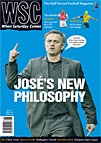 Chris Taylor went to listen to a player with radical views on Italian football culture
Chris Taylor went to listen to a player with radical views on Italian football culture
A lecture called “Money, Politics and Violence: does Italian football have a future?” doesn’t sound a barrel of laughs. As one of the speakers, John Foot, author of Calcio, A History of Italian Football, once wrote: “Calcio is a stinking corpse riddled with maggots.” Foot now admits his outlook, written following the death of a policeman in Catania, was a little pessimistic. Now he compares the game to American televised wrestling – “violent, over-the-top, hysterical and fake” – but he still feels that it has a bright future.
Like Neo from The Matrix, Cristiano Lucarelli is a force for good that can save not just Italian football, but maybe, just maybe, the whole world. One woman in the lecture theatre suggested Lucarelli run for prime minister after his playing days, a suggestion that was met by rapturous and slightly hysterical applause. But, as Foot was at pains to point out, Lucarelli and his agent Carlo Pallavicino can’t do it on their own. They need the help of other players, agents, fans, presidents and, of course, journalists.
Lucarelli is an atypical footballer, a man loyal to his home-town team, a team he was happy to take a billion lire (£350,000) pay cut to join, from Torino in 2003. “Some players buy themselves a Ferrari or yacht with a billion lire,” he said. “I just bought myself a Livorno shirt.” Lucarelli was an established player at this point and an Under-21 international – though he had fallen out of favour after revealing a Che Guevara T-shirt to the crowd having scored against Moldova in an Under-21 international. Not only did he take a massive pay cut, he also dropped down to Serie B at the same point. It’s easy to kiss your badge when you’re on £50,000 a week, but when the badge is costing you the same amount of money, I imagine it becomes a lot less attractive.
At Livorno, Lucarelli demanded the number 99 shirt, identifying himself with the leftwing ultra group BAL, who were formed in 1999. He often celebrated his goals with a clenched fist salute, in defiance of those who attacked his strong political beliefs. He even dedicated a goal he scored to 400 workers sacked from their factory jobs in Florence. “It didn’t help them physically,” Lucarelli realised, “but it is important to show that your thoughts are with them at these times.”
It is people like Lucarelli, Gianfranco Zola and, through gritted teeth, Alessandro del Piero, that John Foot identifies as signs of a positive future for Italian football; a future away from greed, power and corruption. Lucarelli stresses he isn’t that unusual a character – other players approach him and say they too believe what he does, but few have the courage to say it publicly. Lucarelli even has great respect for Paolo di Canio, who is the rightwing, polar opposite of himself. While Lucarelli doesn’t agree with anything Di Canio has to say, he feels he should be applauded and encouraged to speak publicly.
Any bright new dawn for calcio may still be some way off. Foot worries that in the wake of the large-scale corruption scandal that led to Juventus’s relegation to Serie B in 2006, nothing has been resolved. The same dubious characters who ran the game last year are still in power. They may have all switched seats, but they remain the important figures.
A question was put to Lucarelli that Italian football could not be rid of scandal and corruption when the pervading national culture is based around success and winning at all costs. How could football be free from a problem that is part of a wider social ill? Lucarelli just grinned and said he didn’t and couldn’t know – he left school at 14 and was in no position to comment. Which completely nailed it. Cristiano Lucarelli is a fine footballer and undoubtedly a fine man. He’s a less irritating Gary Neville, exactly the sort of player every fan loves to have on their team, but he is just a player; to hold him up as the saviour of calcio, or anything other than Livorno’s Serie A status, would be ludicrous. Lucarelli believes that until the Italian people learn how to accept defeat, then all the problems their football has faced over the past year, the corruption and the violence, will continue.
Meanwhile, Lucarelli has fallen out with Livorno’s club president, as well as a section of the support who he feels haven’t loved him the way he loves their club. He may be leaving and would like to play in England. “If I had super-natural powers,” Lucarelli said, “I would pick up Livorno and place it in England. To me, that would be ideal.” Well, if I had super-natural powers, I’d magic myself a billion lire and buy myself a Ferrari or yacht, but then that’s one of a myriad reasons why I’m not the role model for an new era in Italian football.
From WSC 244 June 2007. What was happening this month